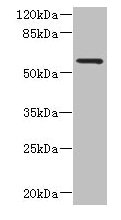Full Product Name
Rabbit anti-Homo sapiens (Human) FCRL4 Polyclonal antibody
Alternative Names
CD307d antibody; Fc receptor homolog 4 antibody; Fc receptor like 4 antibody; Fc receptor like protein 4 antibody; Fc receptor-like protein 4 antibody; FcR like protein 4 antibody; FcR-like protein 4 antibody; FcRH4 antibody; FcRL4 antibody; FCRL4_HUMAN antibody; hIFGP2 antibody; IFGP family protein 2 antibody; IGFP2 antibody; Immune receptor translocation associated protein 1 antibody; Immune receptor translocation-associated protein 1 antibody; Immunoglobulin superfamily receptor translocation associated 1 antibody; Immunoglobulin superfamily receptor translocation associated gene 1 antibody; IRTA1 antibody
Immunogen
Recombinant Human Fc receptor-like protein 4 protein (20-387AA)
Immunogen Species
Homo sapiens (Human)
Conjugate
Non-conjugated
The FCRL4 Antibody (Product code: CSB-PA836277LA01HU) is Non-conjugated. For FCRL4 Antibody with conjugates, please check the following table.
Available Conjugates
| Conjugate |
Product Code |
Product Name |
Application |
| HRP |
CSB-PA836277LB01HU |
FCRL4 Antibody, HRP conjugated |
ELISA |
| FITC |
CSB-PA836277LC01HU |
FCRL4 Antibody, FITC conjugated |
|
| Biotin |
CSB-PA836277LD01HU |
FCRL4 Antibody, Biotin conjugated |
ELISA |
Purification Method
>95%, Protein G purified
Concentration
It differs from different batches. Please contact us to confirm it.
Buffer
Preservative: 0.03% Proclin 300
Constituents: 50% Glycerol, 0.01M PBS, PH 7.4
Tested Applications
ELISA, WB
Recommended Dilution
| Application |
Recommended Dilution |
| WB |
1:500-1:2000 |
Storage
Upon receipt, store at -20°C or -80°C. Avoid repeated freeze.
Lead Time
Basically, we can dispatch the products out in 1-3 working days after receiving your orders. Delivery time maybe differs from different purchasing way or location, please kindly consult your local distributors for specific delivery time.
Usage
For Research Use Only. Not for use in diagnostic or therapeutic procedures.







